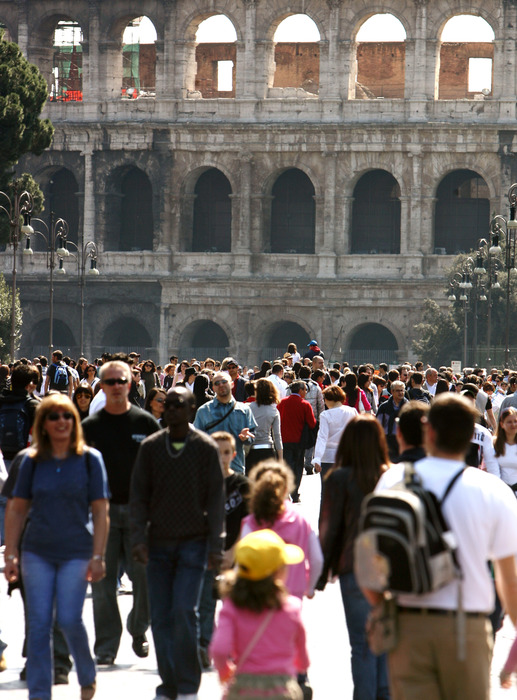Taranto, a city of 200,000 inhabitants far south of Italy, is currently demonstrating a lot. It is about the fate of Europe's largest steel plant, the only big employer in the world, around 15,000. Jobs in the factory and its suppliers.
To save these jobs, thousands of people are moving through the streets of Taranto. But thousands of other protesters are calling for the closure of the plant, which has caused many people to become ill and not a few to die.
Ciro De Luca / REUTERS
Protesters demand the closure of the steel plant in Taranto
For years, the company survives only with state money and short-time work. Actually, it wanted to take over the world's largest steel producer, ArcelorMittal. With the government in Rome, the conditions were already poured into contract: For example, that parts of the plant may be closed and the management gets an immunity and in the time to the plant is modernized, not responsible for possible environmental or health damage.
But now the governing coalition in Rome has once completely undermined everything: the Social Democrats (PD) do not want to accept dismissals, the 5-star movement that had promised in the election campaign to make the toxic steelworks an amusement park no longer wants the promised immunity accept. ArcelorMittal then canceled everything. Nobody knows how it goes on. Taranto may soon have a toxic industrial wasteland in the middle of the city.
Legal uncertainty and confused political intervention
The process exemplifies how politics and the state apparatus are slowing down Italy's economic development. There is no legal certainty for investors when agreements are obsolete overnight. Especially since the judiciary takes years to prevent breaches of contract and rule violations of government agencies - perhaps -. And above all, the state bureaucracy, which takes even longer to approve a location or even the installation of a sign. Hundreds of large, long-awaited investment projects are paused because the approvals are missing or the promised state subsidies are not in the budget - or the government blocks everything because it suddenly wants to set other priorities.
In addition: Every minister, every member of parliament has his own ideas, which can lead to the promotion of a region, an industry, a professional group in the bushes of completely confusing budgetary laws. For the budget for the coming year, there are 900 amendments and supplementary applications. It all costs a lot of money, is useless at best, but mostly counterproductive.
More deficit, more debt
No wonder Italy is deep in the bog. The budget deficit, which is 2.2 percent this year according to EU estimates, will not be smaller next year - though that was always promised - but a bit bigger (2.3 percent). For 2021, the EU Commission even expects 2.7 percent.
Of course, this is also the debt mountain. Italy's public debt (relative to gross domestic product) rose to 134.8 percent last year, climbing to 136.2 this year, to 136.8 this year, and to 137.4 percent in 2021.
Stefano Rellandini / REUTERS
Banking metropolis Milan: The economy does not budge
The interest payments for the high debts swallow up a lot of money. This year, the Minister of Finance was still lucky: After the break of the old coalition and the withdrawal of the Lega with its right-wing premier Matteo Salvini, interest rates fell, so that the Roman Minister of Finance must spend five billion euros less than feared.
But investor confidence is dwindling again - be it out of mistrust in politics or economic development - and Italy now has to pay about as high a risk premium on its debt as Greece. Recently it was a bit more for a short time.
Italy's industry: suspended
The third largest economy in the eurozone simply can not get going. Italy has the lowest economic growth - 0.1 in this, 0.4 in the next year, and even in two years it will according to the forecasts of EU economists at most 0.7 percent. Roughly speaking, this means zero growth.
Unlike most other euro area countries (except Greece), Italy has not returned to its previous level since the 2007 crisis. Until that happens, according to the Brussels experts, it will take another seven to eight years. A scythe.
Above all, Italy's industry seems to be dependent on European development. 700,000 jobs were lost there in the past 25 years. For example, the once-leading household appliances industry in Europe lost 20 percent of its sales in the past ten years.
And it goes on. In the auto industry, Peugeot and Fiat Chrysler are currently negotiating a merger. Then Italy's last industrial colossus with 250,000 jobs, which already has its operational headquarters in London and its headquarters in Amsterdam, would probably be de-Italianized.
Of course, there are still very successful companies in Italy, such as Luxottica (merged with the French Essilor) or Fincantieri, the largest European shipbuilding company.
But many large companies have broken away or stopped. Example Pirelli: The tire producer was 1989 with a conversion of the equivalent of 5.3 billion euros larger than the German competitor Continental (4.2 billion euros) and wanted to take over even then. In 2018, Pirelli sold only 5.2 billion euros, while Continental 44.4 billion - more than eight times.







